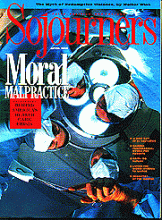In the hills of Western Massachusetts, Randy Kehler and Betsy Corner have been engaged in a remarkable effort to turn their country around, and they have been paying a heavy price for it. What they won't pay is their federal taxes which are used to finance weapons and war. Instead, they pay all their state and local taxes and donate their federal taxes to programs that serve war victims and the poor. They call it "tax re-direction." Joyce Hollyday told the story in the May 1990 Sojourners of how the IRS had seized Randy and Betsy's house and threatened to evict the couple and their 12-year-old daughter, Lillian.
In early December, IRS agents entered their Colrain, Massachusetts farmhouse; both husband and wife were arrested, all their furniture and belongings were taken, and Randy was put in jail for a six-month sentence, which the judge threatened to renew indefinitely unless the family promised never to return to the home they had lived in for more than 12 years.
What the IRS probably didn't count on was the people who decided to support Randy and Betsy and their conscientious actions by moving into their home to block the IRS claim on the house. The arrest of the first group (who were later released) has not deterred new and successive waves of supporters (from the area and from hundreds of miles away), who have come every week since to occupy the house and show their own determination to change the priorities of this country. Groups are already scheduled through the summer.
This little frame house is rapidly becoming a powerful symbol of the commitment of a growing number of citizens to turn their nation around--away from massive military spending, repeated interventions, and dangerous arms races; toward a fundamental conversion of our politics and economy in ways that address our most urgent needs and national crises, especially now, with the opportunity provided by the end of the Cold War.
Read the Full Article

